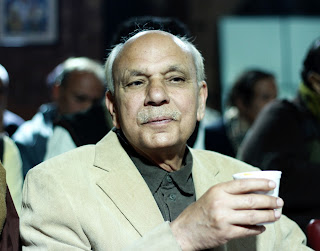|
Kenyan novelist,
playwright and essayist Ngugi bade farewell to the Englishlanguage and
started writing in his native language Kikuyu (Gikuyu) and Swahili.
He called English, the language of colonisers, a `cultural bomb`. Not only
that, he abandoned his Christian first name, James, for his native wa
Thiong`o. His persecution in his own country, forced exile and sexual assault
on his wife on his return to his homeland did not deter him from his
nationalist approach.
To Ngugi, language and culture are inseparable and in his book of essays,
Decolonising the Mind, he says, `Language as communication and as culture are
then products of each other`. Language is the main source of knowledge which,
to Michel Foucault, is inseparable from power as he uses the
term`power-knowledge` nexus. Hence language, a tool of colonisers, even in
the post-colonial world, also becomes a tool of resistance and any writer
opting to write in his/her native language, especially despite knowing the
language of power, like Ngugi becomes a part of the struggle for cultural
decolonisation. Language of power in our case is also English.
Nain Sukh, a nom de plume for Khalid Mahmood, is one such writer who, despite
knowing the English language, has been writing in Punjabi for quite some
time. A lawyer by profession, he has had three books of short stories and one
each of poetry and novel to his credit.
Shaheed?is his latest short story collection. It contains four short stories
and a novelette. If writing in one`s native language is resistance, then Nain
Sukh takes it a step further by taking on the powers that be in his
autobiographical short story, Shaheed? Here he describes the personal trauma
while chronicling the unchecked corruption in the military.
Narrating the story from one`s real life can be cathartic as well as painful
for describing a tragic part of life is equivalent to reliving it. Personal
is political for the writer in this story as he details the life of his
brother Lt Col Shakeel Ahmed from the childhood till his `killing` by his
peers. Using the technique of monologue, the writer exposes the army
generals` treatment of the honest junior officers who to them are `files to
wanton boys and they kill them for their sport` The story shows the growth of
a competent officer to the higher ranks who becomes embroiled in the
corruption ridden set-up in one of the most volatile parts of the country,
Balochistan, where those in power fish in troubled waters. Col Shakeel finds
himself stuck between the devil and the deep blue sea and being privy to the
mess but not being a part of it is a hard task which results in the
catastrophe. The predicament of the narrator is more intensified as he, being
a civilian, can`t get a clear picture of the situation. More so, when the
institution, considered the most `professional` in the country, keeps
everything hushhush and manipulation by its biggest starsis pushedunderthe
carpet.
Nain Sukh hinges his fiction on the real events, people`s history and folk
wisdom and the end result reaches the readers in a form which is more of a
literary reportage. In his first story (Shaheed?), the Panama Leaks, real
estate scandals, army-owned companies` underhand deals and the actual
newspaper reports have been made a part ofthe narrative.
Margalla, the second story in the collection, has the expansion of real
estatein Islamabad and Rawalpindi and its vandalism as its theme. For such a
story, the mention of a property tycoon is almost sine qua non as any story
on the subject of property development in recent history of Pakistan would be
incomplete without him. With his mention, the natural spin-offs are the
establishment and then the infamous scandal of the colluding journalist.
Nain Sukh looks to be too much fascinated with the subject of history, both
written and oral. While Margalla traces some history of the region of
Pothohar, another story, Chumbay Di Booti, narrates the history of Jhang and
Chiniot. Exploring the distant past of both the cities, the writer dwells on
sectarianism which has plagued not only the region but the whole country
along with the rise of terrorism. He juxtaposes the conditions of the land of
mystic poet Sultan Bahu in the distant past with the recent ones, showing the
upsurge in extremism, helping the readers draw their own conclusions.
The author exposes the politics and agenda behind the provincialism and
nationalism while utilising his history and real life events as he uses a
gang rape incident which remained in media focus for quite some time in the
short story, Fort Munro Gang Rape. Different characters represent provinces
and regions and through them biases and hatred are focused. Nain Sukh
deconstructs the myth of nationalism and regionalism with the addition of Ayyan
Ali case and ferocious hunt of houbara bustard in south Punjab.
Though Nain Sukh`s preoccupation with history and plethora of information and
his technique of reportage give him unique narrative style, his hallmark
sometimes disturbs the flow of the story with multiple digressions.
The story and the plot are lost in the reportage and do not move forward.
The irrelevant tangential incidents and historical facts and figures become
something like what`s a Homeric simile in an epic poem. His skipping of
auxiliary verbs in sentences also hinders the flow of reading. However, his
stories address the most relevant subjects in Punjab which is also at the
centre of the politics of the country, also for the wrong reasons.
|















































